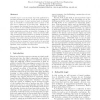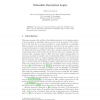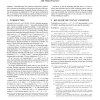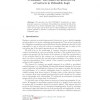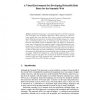AUSAI
2003
Springer
15 years 5 months ago
2003
Springer
Most of the theories on formalising intention interpret it as a unary modal operator in Kripkean semantics, which gives it a monotonic look. We argue that policy-based intentions [...
101
Voted
ADC
2003
Springer
15 years 5 months ago
2003
Springer
Defeasible logic is a non-monotonic logic with applications in rule-based domains such as law. To ease the development and improve the accuracy of expert systems based on defeasib...
ICAIL
2003
ACM
15 years 5 months ago
2003
ACM
Defeasible Logic is a promising representation for legal knowledge that appears to overcome many of the deficiencies of previous approaches to representing legal knowledge. Unfor...
RULEML
2004
Springer
15 years 5 months ago
2004
Springer
We propose to extend description logic with defeasible rules, and to use the inferential mechanism of defeasible logic to reason with description logic constructors.
121
click to vote
RULEML
2004
Springer
15 years 5 months ago
2004
Springer
Abstract. Defeasible reasoning is a rule-based approach for efficient reasoning with incomplete and inconsistent information. Such reasoning is, among others, useful for ontology i...
101
click to vote
ECAI
2004
Springer
15 years 5 months ago
2004
Springer
Abstract. Defeasible logic (DL) promotes enthymemic, argumentative reasoning on incomplete set of premisses retracted on the presence of contrary information. Defeasible Prolog (d-...
RULEML
2005
Springer
15 years 5 months ago
2005
Springer
Defeasible Logic is a rule-based non-monotonic logic with tractable reasoning services. In this paper we extend Defeasible Logic with nested rules. We consider a new Defeasible Log...
RULEML
2005
Springer
15 years 5 months ago
2005
Springer
Abstract. We introduce the DR-CONTRACT architecture to represent and reason on e-Contracts. The architecture extends the DR-device architecture by a deontic defeasible logic of vio...
107
click to vote
RULEML
2005
Springer
15 years 5 months ago
2005
Springer
Defeasible reasoning is a rule-based approach for efficient reasoning with incomplete and inconsistent information. Such reasoning is useful for many applications in the Semantic W...
134
Voted
PCI
2005
Springer
15 years 5 months ago
2005
Springer
Defeasible reasoning is a rule-based approach for efficient reasoning with incomplete and inconsistent information. Such reasoning is useful for many applications in the Semantic W...

